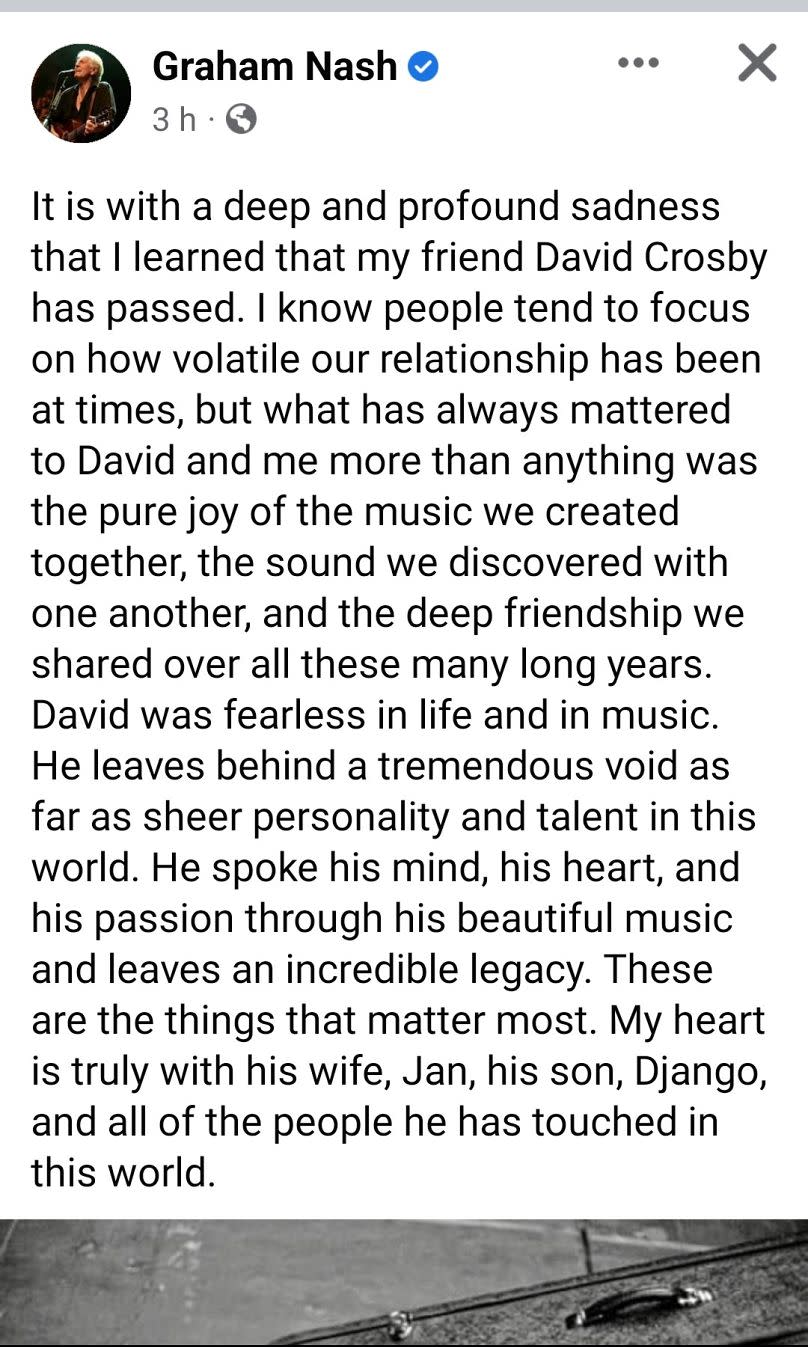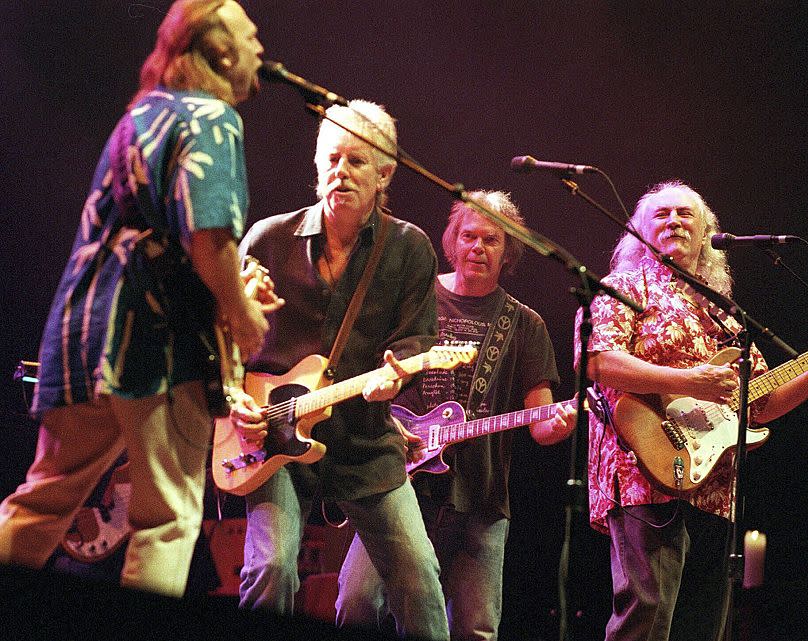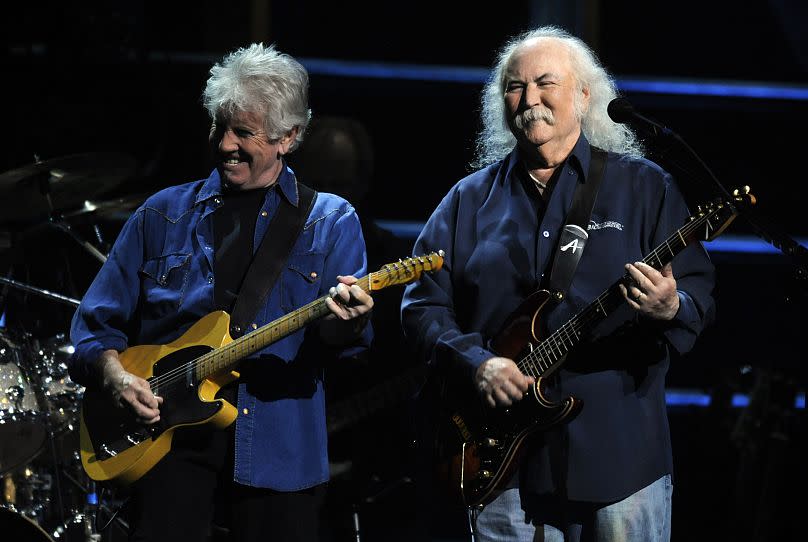Rock musician David Crosby of Crosby, Stills, Nash & Young dies aged 81
David Crosby, the singer-songwriter-guitarist who evolved from a harmony singer with the Byrds to a hippie superstar and an ongoing troubadour in Crosby, Stills, Nash & (sometimes) Young, has died at 81.
The New York Times reported, based on a text message from Crosby's sister in law, that the rock musician died Wednesday night.
A cause of death has not been revealed.
While he only wrote a handful of widely known songs, the witty and ever opinionated Crosby was on the front lines of the cultural revolution of the ’60s and ’70s — whether triumphing with Stephen Stills, Graham Nash and Neil Young on stage at Woodstock, testifying on behalf of a hirsute generation in his anthem 'Almost Cut My Hair' or mourning the assassination of Robert Kennedy in 'Long Time Gone.'

Tributes poured in online, with the likes of Brian Wilson, Marianne Faithful and bandmates Graham Nash and Stephen Stills expressing their sorrow at the news of Crosby’s death.

Crosby became a star in the mid-1960s with the seminal folk-rock group The Byrds, known for such hits as 'Turn! Turn! Turn!' and 'Mr. Tambourine Man.'
Troubled relations with bandmates pushed Crosby out of The Byrds and into a new group. Crosby, Stills and Nash's first meeting is part of rock folklore: Stills and Crosby were at Joni Mitchell’s house in 1968, working on the ballad 'You Don’t Have to Cry,' when Nash suggested they start over again. Nash’s high harmony added a magical layer to Stills' rough bottom and Crosby’s mellow middle and a supergroup was born.
Their eponymous debut album was an instant success that helped redefine commercial music. The songs were longer and more personal than their individual prior outputs, yet easily relatable for an audience also embracing a more open lifestyle.
They worked in every combination possible — as solo artists, as duos, trios and, occasionally, all four together. They played stadiums and clubs. They showed up at the Berlin Wall in 1989 as the Cold War was ending and turned up in 2011 for the Occupy Wall Street protests in New York.

He was a founder of the Los Angeles rock music community from which such performers as the Eagles and Jackson Browne later emerged.
He advocated for peace, but was an unrepentant loudmouth who practiced personal warfare and acknowledged that many of the musicians he worked with no longer spoke to him.
“Crosby was a colorful and unpredictable character, wore a Mandrake the Magician cape, didn’t get along with too many people and had a beautiful voice — an architect of harmony,” Bob Dylan wrote in his 2004 memoir, “Chronicles: Volume One.”
Crosby's drug use left him bloated, broke and alienated. He kicked the addiction in 1985 and 1986 during a year’s prison stretch in Texas on drug and weapons charges. The conviction eventually was overturned.
“I’ve always said that I picked up the guitar as a shortcut to sex and after my first joint I was sure that if everyone smoked dope there’d be an end to war,” Crosby said in his 1988 autobiography, “Long Time Gone,” co-written with Carl Gottlieb. “I was right about the sex. I was wrong when it came to drugs.”

Crosby underwent a liver transplant in 1994 after decades of drug use and survived diabetes, hepatitis C and heart surgery in his 70s.
He lived years longer than even he expected and in his 70s enjoyed a creative renaissance, issuing several solo albums while collaborating with others including his son James Raymond, who became a favorite songwriting partner.
“Most guys my age would have done a covers record or duets on old material,” he told Rolling Stone in 2013, shortly before “Croz” was released. “This won’t be a huge hit. It’ll probably sell nineteen copies. I don’t think kids are gonna dig it, but I’m not making it for them. I’m making it for me. I have this stuff that I need to get off my chest.”
In 2019, Crosby was featured in the documentary David Crosby: Remember My Name, produced by Cameron Crowe.
While his solo career thrived, his seemingly lifetime bond with Nash dissolved. Crosby was angered by Nash’s 2013 memoir “Wild Tales” and relations between the two spilled into an ugly public feud, with Nash and Crosby agreeing on one thing: Crosby, Stills and Nash was finished. Donald Trump’s election as US president did lead Crosby to suggest that he was open to a Crosby, Stills, Nash and Young protest tour, but his old bandmates declined to respond.

 Yahoo News
Yahoo News 
